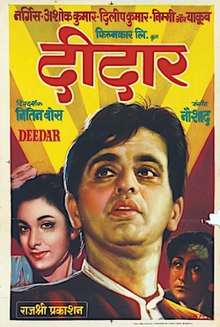Deedar (1951 film)
Deedar (lit. 'Glance') is a 1951 Hindi film directed by Nitin Bose, starring Ashok Kumar, Dilip Kumar, Nargis and Nimmi. It is a story of unfulfilled love, where the hero's childhood love is separated from him due to class inequalities. It is one of noted tragedies made in early Hindi cinema. It became a popular film of the Golden era and further established Dilip Kumar as the "King of Tragedy".[1][2]
| Deedar | |
|---|---|
 Poster | |
| Directed by | Nitin Bose |
| Produced by | Rajendra Jain |
| Written by | Azm Bazidpuri |
| Starring | Ashok Kumar Dilip Kumar Nargis Nimmi |
| Music by | Naushad Shakeel Badayuni (lyrics) |
| Cinematography | Dilip Gupta |
| Edited by | Bimal Roy |
Production company | |
| Distributed by | Filmkar Productions Ltd. |
Release date | March 16, 1951 |
Running time | 130 minutes |
| Country | India |
| Language | Hindi |
Many years later, when Deedar was having a rerun at Mumbai theatres, actor Manoj Kumar asked director Raj Khosla to accompany him to the show. Thereafter, the story of Do Badan (1966) was written after reworking its story line, that film was also a hit.[3] It is referred to repeatedly in the Vikram Seth's 1993 novel A Suitable Boy, in which people watching it burst into tears and people who can't get tickets start a riot.[4] The film was remade in Tamil as Neengadha Ninaivu (1963).[5]
Cast
- Ashok Kumar as Dr. Kishore
- Nargis as Mala
- Dilip Kumar as Shamu
- Nimmi as Champa
- Murad
- Tabassum as Baby Mala (as Baby Tabassum)
- Tun Tun as Rai' s maidservant (as Uma Devi)
- Surendra (as Surrender)
- Agha Miraz (as Agha Mehraj)
- Yakub as Choudhury
- Motilal as Bhalla
- Parikshit Sahnias master shamu
Soundtrack
The Soundtrack was composed by the legend Naushad, with lyrics by Shakeel Badayuni. The all-around soundtrack consisted of all the elements of a great album. It exploited the talents of singing legends such as Mohammad Rafi, Lata Mangeshkar, Shamshad Begum and G. M. Durrani to the utmost. This was also amongst those few soundtracks in which the career of veteran Mohammad Rafi coincided with that of his idol G. M. Durrani.
| No. | Title | Singer(s) | Length |
|---|---|---|---|
| 1. | "Bachpan Ke Din Bhoola Na Dena (Male)" | Mohammed Rafi | 02:04 |
| 2. | "Huye Hum Jinke Liye Barbad (Part 1)" | Mohammed Rafi | 03:43 |
| 3. | "Huye Hum Jinke Liye Barbad (Part 2)" | Mohammed Rafi | 01:29 |
| 4. | "Naseeb Dar Pe Tera Aazmane Aya Hoon" | Mohammed Rafi | 03:37 |
| 5. | "Meri Kahani Bhoolne Wale" | Mohammad Rafi | 03:09 |
| 6. | "Dekh Liya Maine Kismat Ka Tamasha" | Lata Mangeshkar, Mohammed Rafi | 03:44 |
| 7. | "Tu Kaun Hai Mera Kehde Balam" | Lata Mangeshkar | 03:20 |
| 8. | "Le Ja Meri Duayeein Le Ja" | Lata Mangeshkar | 03:51 |
| 9. | "Duniya Ne Teri Duniyawale" | Lata Mangeshkar | 03:14 |
| 10. | "Bachpan Ke Din Bhoola Na Dena (Female)" | Shamshad Begum, Lata Mangeshkar | 03:35 |
| 11. | "Chaman Mein Rakhe Verana" | Shamshad Begum | 03:11 |
| 12. | "Nazar Phero Na Humse" | Shamshad Begum, G. M. Durrani | 03:51 |
| Total length: | 38:48 | ||
References
- Tilak Rishi (2012). Bless You Bollywood!: A Tribute to Hindi Cinema on Completing 100 Years. Trafford Publishing. p. 38. ISBN 978-1-4669-3963-9.
- Bhaichand Patel (2012). Bollywood's Top 20: Superstars of Indian Cinema. Penguin Books India. p. 84. ISBN 978-0-670-08572-9.
- "Cinema : Do Badan (1966)". The Hindu. 15 October 2010. Retrieved 13 March 2014.
- Vikram Seth (1993). A Suitable Boy. Penguin Books India. pp. 134–. ISBN 978-0-14-023033-8.
- Guy, Randor (20 August 2016). "Neengatha Ninaivu (1963)". The Hindu. ISSN 0971-751X. Retrieved 22 January 2019.